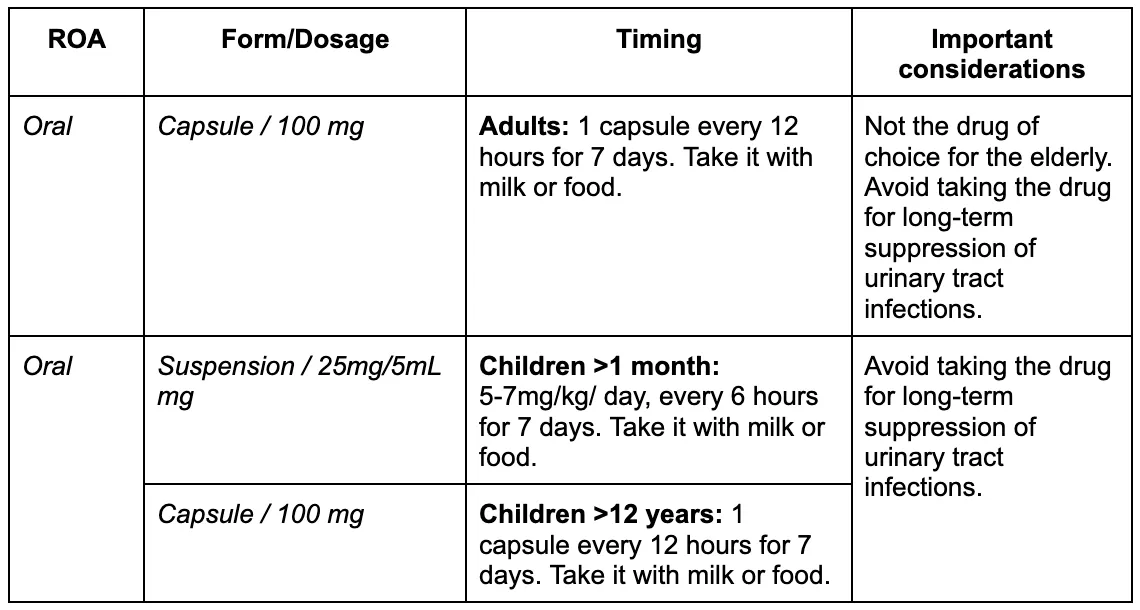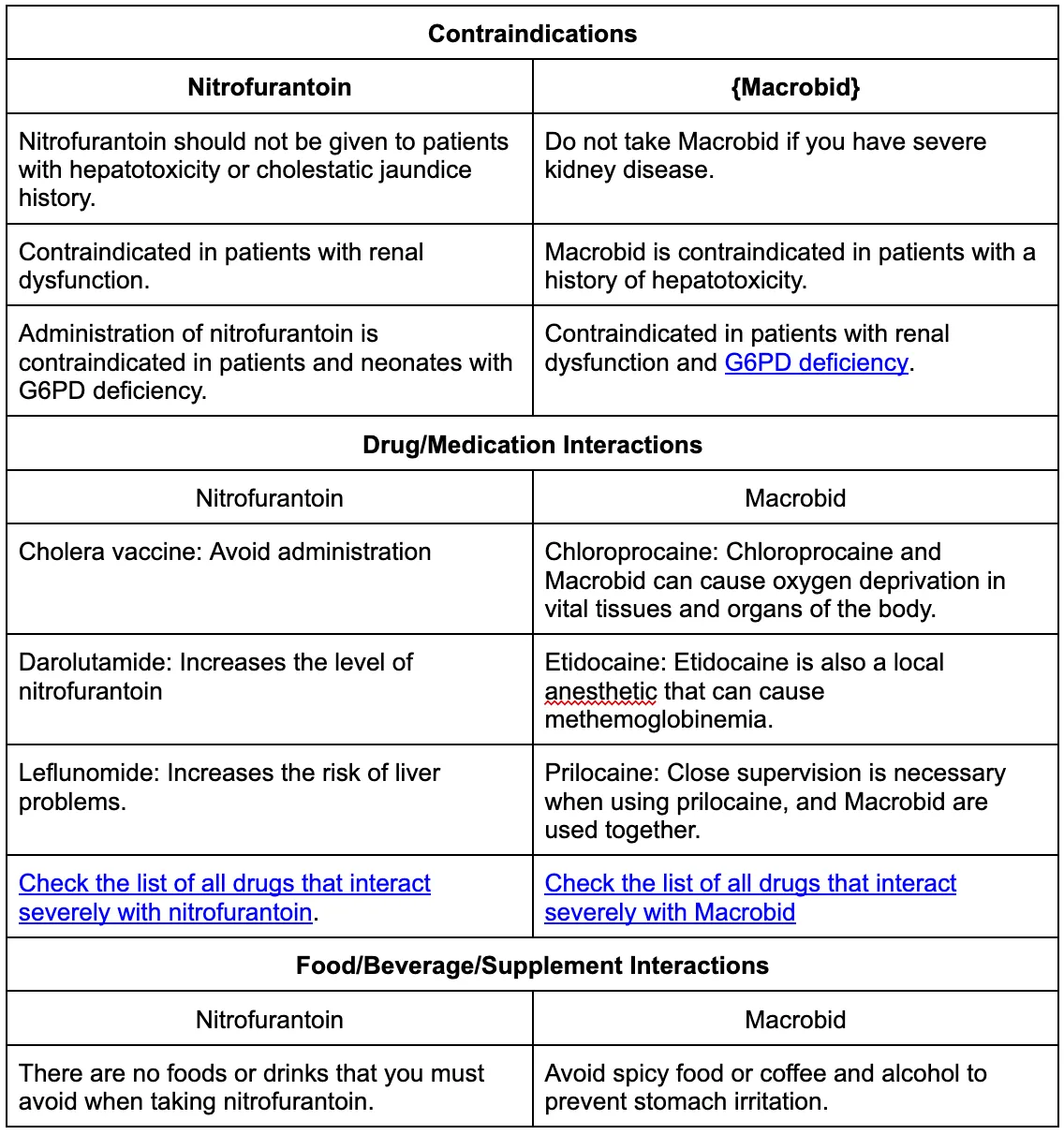Nitrofurantoin vs Macrobid
Introduction
For acute and uncomplicated urinary tract infections, clinicians often prescribe nitrofurantoin or Macrobid for its treatment and prophylaxis. Nitrofurantoin is the generic name of Macrobid. These drugs are bactericidal against many pathogens in the lower urinary tract and work by interfering with the synthesis of essential proteins, DNA, and RNA of the bacteria. Nitrofurantoin is met with minimum bacterial resistance as compared to other antibiotics, but it is contraindicated in patients with an allergic reaction to the drug component and a history of hepatotoxicity and renal dysfunction.
About nitrofurantoin and macrobid
What is Nitrofurantoin?
Nitrofurantoin, a urinary anti-infective drug, belongs to a class of broad-spectrum antibiotic medications called nitrofurans. Nitrofurantoin is prescribed to treat uncomplicated lower urinary tract infections. UTIs can be caused by gram-positive or gram-negative bacteria, and nitrofurantoin is effective against most of these organisms. With the increasing resistance against newer antibiotics, and prevalence of extended-spectrum beta-lactamases, nitrofurantoin is widely prescribed as a first-line therapy for urinary tract infections.
Nitrofurantoin is a generic name that is available in different brands such as Macrobid, Macrodantin, Furadantin, etc. Nitrofurantoin was first approved by FDA in 1953.
Nitrofurantoin is bactericidal against Escherichia coli and other pathogens that commonly cause urinary tract infections. It interferes with the synthesis of vital proteins, DNA, and RNA in a bacterial cell, thus leading to its death. The resistance to nitrofurantoin is minimum as it doesn’t affect the bowel flora and maintains a low serum concentration.
What conditions is nitrofurantoin approved to treat?
FDA approves the usage of nitrofurantoin for the treatment of acute uncomplicated urinary tract infections caused by;
- susceptible strains of Escherichia coli
- Staphylococcus saprophyticus.
Nitrofurantoin is also bactericidal against other urinary tract pathogens, such as;
- Enterococci
- Klebsiella
- Enterobacter.
Nitrofurantoin is also used as a prophylactic agent for recurrent urinary tract infections.
How does nitrofurantoin work for urinary tract infections?
Nitrofurantoin uses different mechanisms to achieve a bactericidal effect against these organisms. Flavoproteins are oxidizing enzymes present within bacterial cells. Nitrofurantoin is taken up by these flavoproteins and activated via the reduction process into reactive intermediates.
These unstable metabolites bind to the bacterial ribosomes and inhibit the enzymes responsible for the synthesis of DNA, ribosomal RNA, proteins, and other vital intracellular components, hence killing the bacteria. This broad spectrum of nitrofurantoin mechanism explains why bacterial resistance against this antibiotic is at a minimum.
What is Macrobid?
Macrobid is an antibiotic medication that is used to treat and prevent urinary tract infections. It is bactericidal against Escherichia coli, Staphylococcus saprophyticus, and other strains. Macrobid is the brand name for nitrofurantoin and was approved by FDA to reduce the development of drug-resistant bacteria. Macrobid doesn’t work against viral infections and shouldn’t be used to treat or prevent any condition that is not strongly proven to be caused by bacteria. Macrobid is also a nitrofuran antibiotic. It collects in the lower urinary tract to kill the bacteria by damaging the essential proteins, DNA, and RNA needed for survival.
What conditions is Macrobid approved to treat?
Macrobid is prescribed for the treatment of urinary tract infections caused by susceptible strains of;
- Escherichia coli
- Enterobacter spp.
- Staphylococcus aureus
- Klebsiella spp.
- S. saprophyticus.
How does Macrobid work for urinary tract infections?
Macrobid interferes with and alters the ribosomal proteins in a bacterial cell and other macromolecules that are involved in cell wall synthesis and metabolism. Macrobid is taken up by the intracellular flavoproteins of bacteria and reduced to reactive intermediates. This conversion is responsible for the bactericidal effect of this drug against pathogens of urinary tract infections.
Effectiveness
How effective are Nitrofurantoin and Macrobid for treating urinary tract infections?
Nitrofurantoin and Macrobid have the same generic name, which is nitrofurantoin. Nitrofurantoin is used to treat urinary tract infections that are caused by susceptible bacteria.
Macrobid or Nitrofurantoin (monohydrate/macrocrystals) has two forms of nitrofurantoin. The microcrystalline nitrofurantoin is dissolved and absorbed gradually, and the remaining monohydrate nitrofurantoin forms a gel matrix that releases the drug over time as exposed to gastric or intestinal fluids. This is why the bioavailability of nitrofurantoin is 80% in healthy individuals.
The therapeutic urinary concentration of nitrofurantoin is increased when it is taken with food. This medication is soluble in urine and achieves bactericidal effects in the lower urinary tract. It imparts a brown color to the urine.
Dosage information
How is nitrofurantoin administered for urinary tract infections?
Nitrofurantoin is available as a capsule and as an oral suspension (liquid). This drug is taken by mouth two to four times a day, for 7 days, preferably with food.
Nitrofurantoin dosage information
Table 1: Nitrofurantoin dosing considerations for urinary tract infections.

Nitrofurantoin dosage information
Table 1: Nitrofurantoin dosing considerations for urinary tract infections.

Side Effects
What are the most-common side effects of nitrofurantoin?
The most common side effects of nitrofurantoin include:
- Headache
- Upset stomach
- Dizziness
- Mild diarrhea
- Vaginal itching.
Are there any potential serious side effects of nitrofurantoin?
Many people can have an allergic reaction to nitrofurantoin. If you experience any of the following side effects, seek medical help immediately:
- Difficulty breathing
- Swelling of face, tongue, or throat
- Bloody or watery diarrhea
- Worsening cough
- Sudden chest pain
- Fever and chills
- Numbness in hands or feet
- Jaundice
- Joint pain and swelling.
- Older individuals or patients in a much-weakened state are more likely to experience these adverse effects.
What are the most-common side effects of Macrobid?
The most common side effects of macrobid include:
- Drowsiness
- Diarrhea
- Fatigue
- Headache
- Nausea
- Vomiting
- Weakness.
Are there any potential serious side effects of Macrobid?
Macrobid can produce some severe and long-term adverse effects. If you experience any of the following side effects, seek medical help immediately:
- Tarry stools
- Sore throat
- Unusual bleeding
- Stomach pain
- Confusion
- Visual changes
- Vomiting blood.
Contraindications and interactions
Warnings and general precautions for Nitrofurantoin and Macrobid
Some other drugs, such as OTC medications and vitamins, may interact with nitrofurantoin and Macrobid. The most common medications that can interact with nitrofurantoin and Macrobid are antacids that contain magnesium and quinolone antibiotics – moxifloxacin, nalidixic acid, ciprofloxacin, and levofloxacin. Nitrofurantoin can reduce the effects of these antibiotics.
Contraindications and important interactions for Nitrofurantoin and Macrobid

Cost Comparison
How much do Nitrofurantoin and Macrobid cost?
The oral nitrofurantoin 100 mg macrocrystals oral capsule can cost around $19 for 2 capsules. If you are taking nitrofurantoin for the treatment of a urinary tract infection, you usually need to take it for 7 days. A person needs to take 2 capsules per day for 7 days, so the total cost of the treatment can go up to $133.
The typically recommended dose of Macrobid for adults is 100 mg capsules taken by mouth twice a day for 7 days. A supply of 100 capsules can cost you around $636, depending on the particular pharmacy that you visit.
Popularity of Nitrofurantoin and Macrobid
Nitrofurantoin gained popularity when healthcare professionals started witnessing a rise in antibiotic resistance. Furthermore, the clinical efficiency and bacterial cure rate of nitrofurantoin and Macrobid (nitrofurantoin monohydrate/macrocrystals) for the treatment of uncomplicated urinary tract infections ranges from 61 to 92%.
When it comes to the antimicrobials used for urinary tract infections, trimethoprim and sulfamethoxazole are considered the most effective combination. However, its high cost makes it unsuitable for initial treatment. This is why nitrofurantoin is the choice of drug when alternatives are too expensive, or they are not well-tolerated by the patient.
Conclusion
Takeaway
Nitrofurantoin and Macrobid are most commonly chosen as the first line of treatment for uncomplicated and acute urinary tract infections. However, patients must know that long-term use of nitrofurantoin with other broad-spectrum antibiotics can increase the risks of antimicrobial resistance.
When using an antibiotic for a bacterial infection, it is important to verify the dose and duration of treatment before starting the course. Remember to check the adverse effects of the drug and whether you are allergic to nitrofurantoin before taking your first dose. We recommend informing your prescribing clinician about any history of hepatotoxicity or renal dysfunction that you might have to avoid any serious adverse effects in the future.